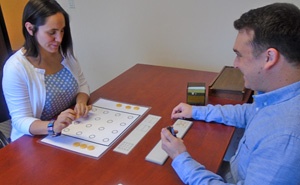Our Testing
Aptitude Assessment
We often describe our aptitude tests as more like puzzles or games, and the types of paper-and-pencil tests you might take in school are kept to a minimum. Clients are asked to do a wide variety of tasks during the testing, like assembling blocks, organizing chips into logical order, solving puzzles, and remembering different types of information. We administer 22 different tests and are able to measure 21 different aptitudes, as well as English vocabulary level. Our service tests for aptitudes ranging from reasoning abilities to idea generation and goal-setting and even includes motor assessments like dexterities and a proprietary workplace personality test. The combination of low, average, and high scores on our tests create the overall aptitude pattern which points to different types of careers. There’s no typical combination of scores to expect from the tests. Every person and aptitude pattern is different.
Our founder, Johnson O’Connor, envisioned each of the tests in our battery as “work samples,” providing someone the opportunity to try out many different types of work before committing to a career path.
We offer monthly information webinars for new clients to learn about our service. Please check our Events page for upcoming dates and to register.

How the tests are administered
About half of our tests are given individually by a trained test administrator in a one-on-one setting. The other half of the tests are administered in an audiovisual format where a video guides the client through a series of tests. Many of the tests we administer are timed, which allows us to provide objective data comparing one person’s performance to others’ in their age range.
Have questions about learning differences? See here.
How our tests are different
We’re often asked how aptitude testing is different from other tests that are available for career and educational guidance. Personality tests, interest surveys, and IQ testing are probably the most widely known assessments (and they are even sometimes called aptitude tests), but true aptitude testing is different from these types of tests.
Interest and personality tests
One important difference between interest surveys or personality tests and aptitude testing is that interest and personality tests often consist of answering self-perception questions, checking boxes in a form, or rating your own abilities on a scale. The results from these types of assessments capture you at one moment in time and can change as your interests, experiences, and even moods change. You’ll also find that most personality tests or interest surveys provide results that are based solely on subjective information (how you perceive yourself) rather than objective data.
Personality tests usually capture interest but they usually do not provide much data about ability. A high school student could be interested in a career in engineering, for example, but if they lack the aptitude for upper-level calculus and physics, their strong interest might not be enough to overcome the challenges they’ll face studying and working in that field. Aptitude testing provides objective data to predict the types of careers someone will thrive in based on 100+ years of research.
IQ testing
IQ tests are used to measure intelligence. IQ tests and aptitude tests have some similarity in that they measure puzzle-solving abilities with scores based on comparing one person to others in the general population. Unlike an IQ score, though, which measures general intelligence, aptitude test results form a pattern, showing someone’s various strengths and weaknesses. Two people can have identical IQ scores but very different aptitude patterns that point to very different careers. A good example of this would be Mary vos Savant and Christopher Harata who have two of the highest recorded IQ scores. One pursued a career in journalism and writing, and the other is an astrophysicist. IQ testing does not provide much value in career selection.
Cost & Scheduling
Our aptitude testing program consists of two sessions, each about three and a half hours long, and the evaluation conference, which can take one to one and a half hours.
These appointments may be scheduled on consecutive days or spread out over several days or even weeks if you prefer, with no effect on the results. Morning sessions start at 8:30 or 9:00 am and afternoon sessions start at 1:00 or 1:30 pm, depending on the local office.
Our current fee is $950. We request a $100 deposit to hold appointments.
Get Started Today
Aptitudes remain stable throughout your life
Aptitudes are not the same as interests. Interests can change, but aptitudes don’t. It’s unlikely that you would have the same interests at age thirty that you did when you were sixteen. You would, however, have the same aptitudes at any age. Aptitudes are natural abilities, and our research has shown that a person’s scores remain fairly stable throughout their lifetime. The information you gain from aptitude testing can be used throughout your working life to plan your schooling, career, hobbies, and even retirement.
















